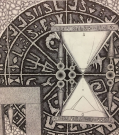Immanuel Velikovsky: Difference between revisions
From Archaix Wiki
(Created page with ""Immanuel Velikovsky (/ˌvɛliˈkɒfski/; Russian: Иммануи́л Велико́вский, IPA: [ɪmənʊˈil vʲɪlʲɪˈkofskʲɪj]; 10 June [O.S. 29 May] 1895 – 17 November 1979) was a Jewish, Russian-American psychoanalyst, writer, and catastrophist.[1][2][3] He is the author of several books offering pseudohistorical interpretations of ancient history, including the U.S. bestseller Worlds in Collision published in 1950.[4] Velikovsky's work is frequently cite...") |
No edit summary |
||
| Line 1: | Line 1: | ||
"Immanuel Velikovsky (/ˌvɛliˈkɒfski/; Russian: Иммануи́л Велико́вский, IPA: [ɪmənʊˈil vʲɪlʲɪˈkofskʲɪj]; 10 June [O.S. 29 May] 1895 – 17 November 1979) was a Jewish, Russian-American psychoanalyst, writer, and catastrophist. | "Immanuel Velikovsky (/ˌvɛliˈkɒfski/; Russian: Иммануи́л Велико́вский, IPA: [ɪmənʊˈil vʲɪlʲɪˈkofskʲɪj]; 10 June [O.S. 29 May] 1895 – 17 November 1979) was a Jewish, Russian-American psychoanalyst, writer, and catastrophist. He is the author of several books offering pseudohistorical interpretations of ancient history, including the U.S. bestseller Worlds in Collision published in 1950. Velikovsky's work is frequently cited as a canonical example of pseudoscience and has been used as an example of the demarcation problem." | ||
* [https://en.wikipedia.org/wiki/Immanuel_Velikovsky Wikipedia] | * [https://en.wikipedia.org/wiki/Immanuel_Velikovsky Wikipedia] | ||
Revision as of 07:06, 8 January 2023
"Immanuel Velikovsky (/ˌvɛliˈkɒfski/; Russian: Иммануи́л Велико́вский, IPA: [ɪmənʊˈil vʲɪlʲɪˈkofskʲɪj]; 10 June [O.S. 29 May] 1895 – 17 November 1979) was a Jewish, Russian-American psychoanalyst, writer, and catastrophist. He is the author of several books offering pseudohistorical interpretations of ancient history, including the U.S. bestseller Worlds in Collision published in 1950. Velikovsky's work is frequently cited as a canonical example of pseudoscience and has been used as an example of the demarcation problem."
